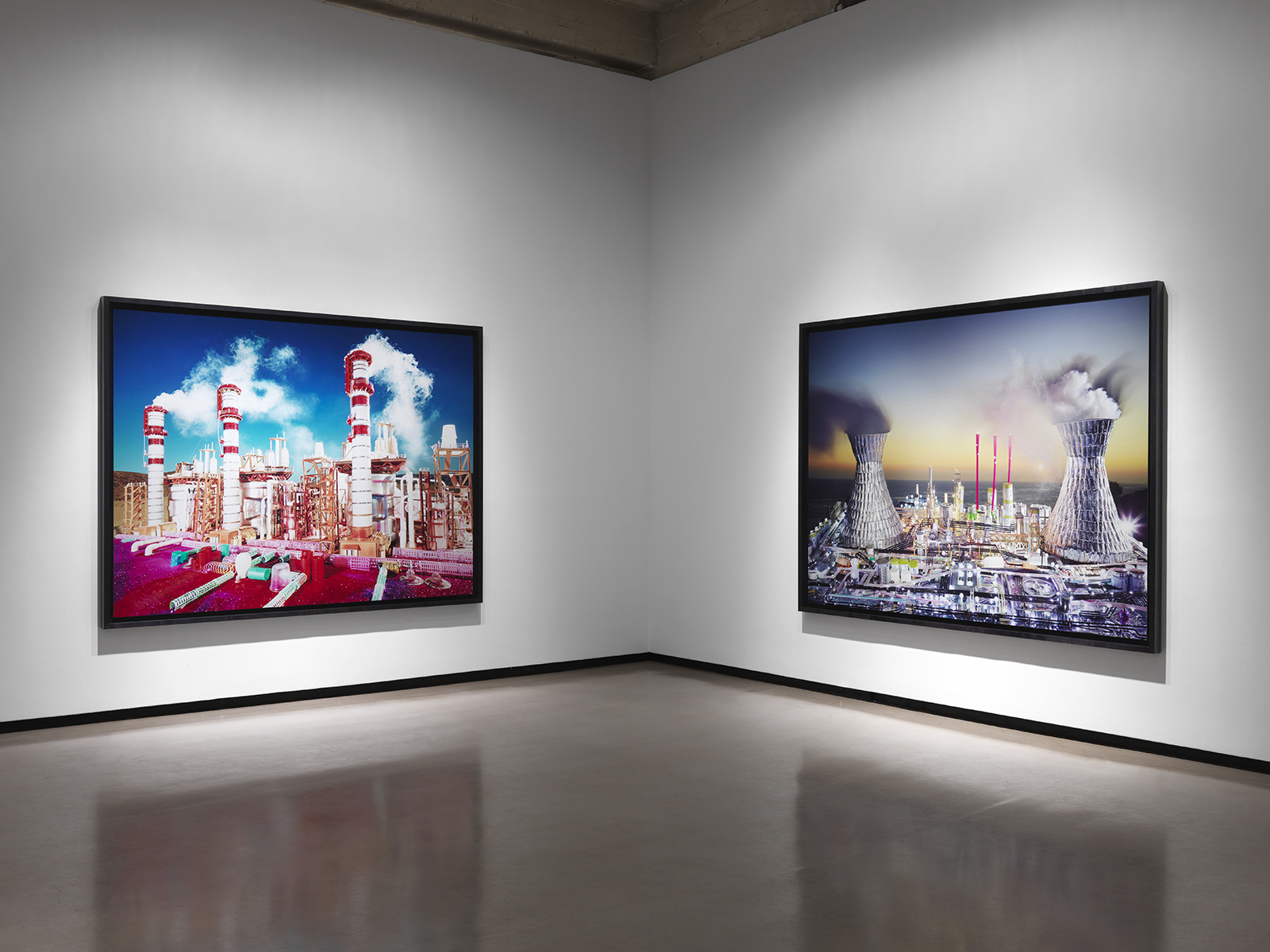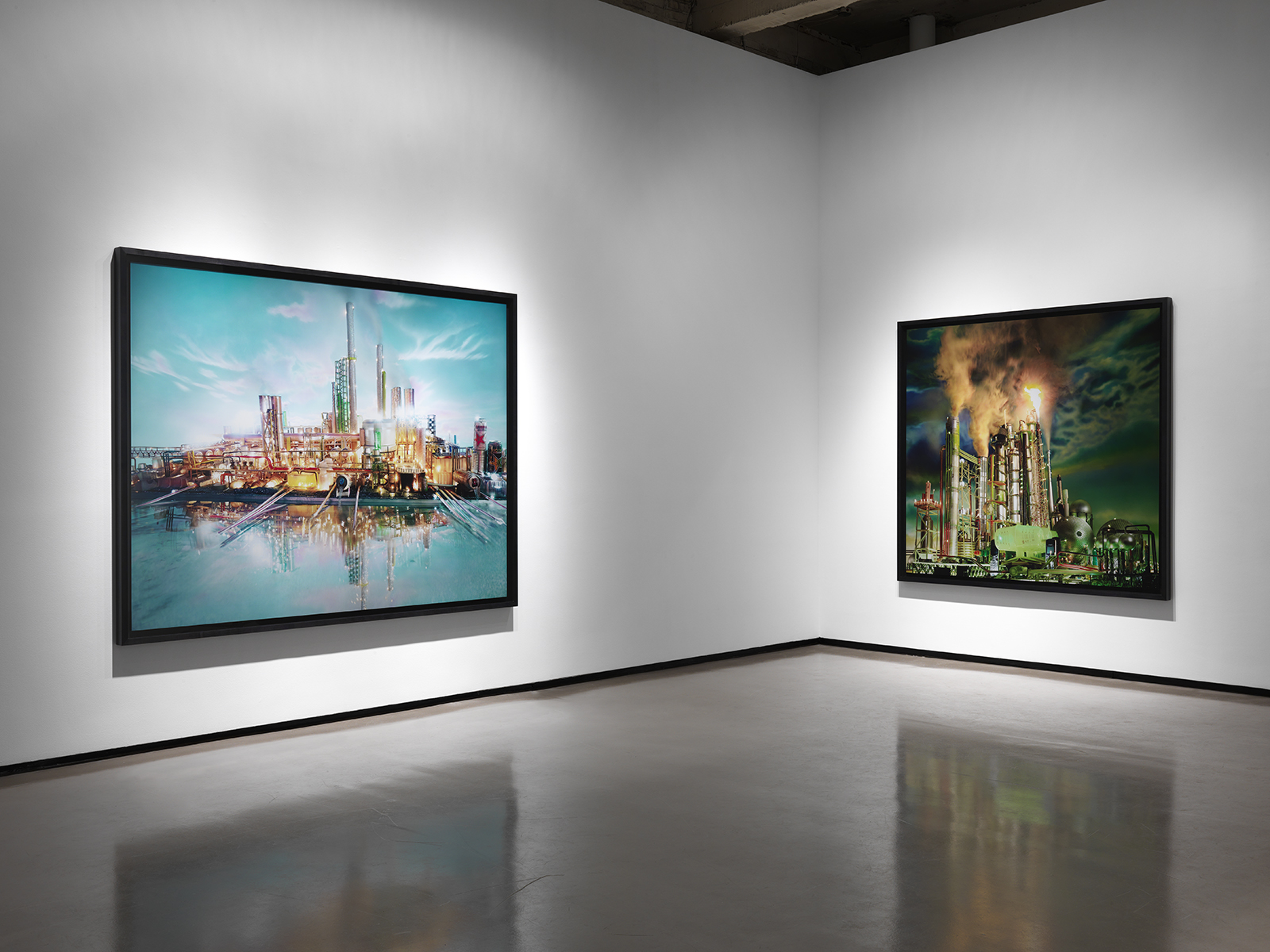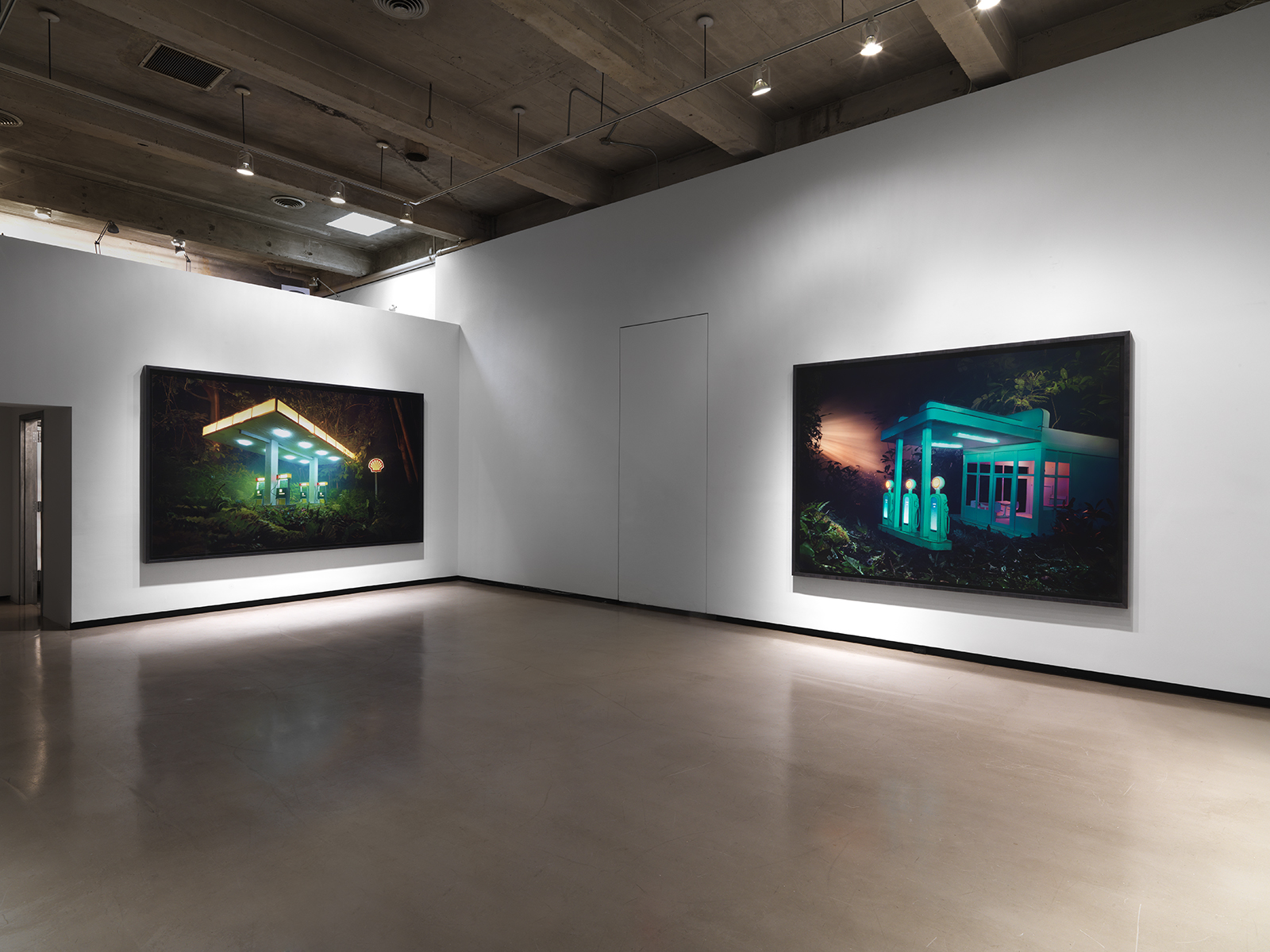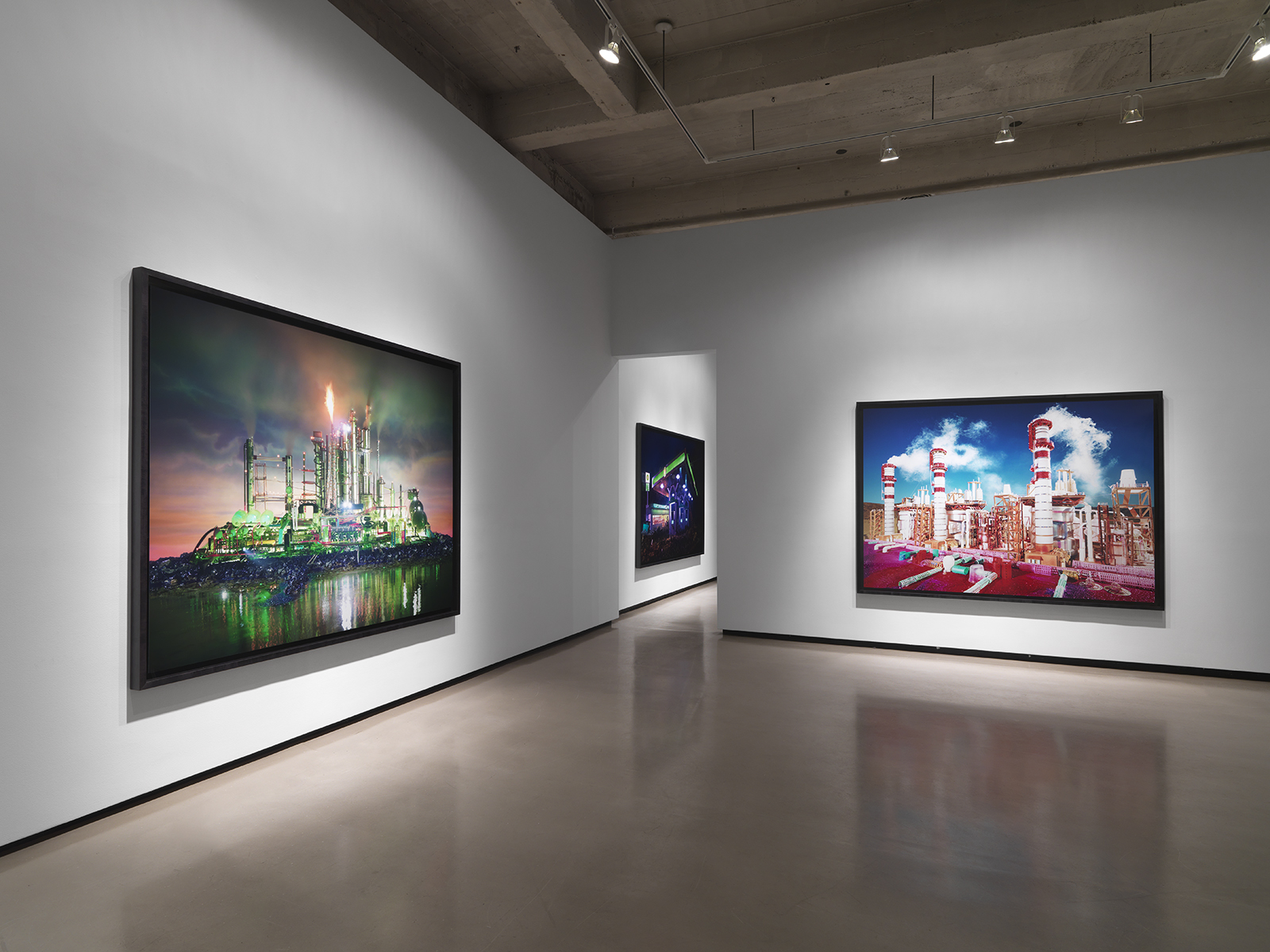(c) Andrea Blanch David LaChapelle
Paul Kasmin Gallery, 3 days before his exhibition.

Andrea Blanch: I’m very curious as to why this subject matter now?
David LaChappelle: A little more than two and half years ago I was in Maui sitting down outside with a friend, it just popped into my head, just randomly, this image of a little gas station in the middle of the jungle at night, kind of glowing. I said to my friend, who is an artist also, “What do you think?” We started making these cardboard gas stations, and Casey is his name, he was building them. I said, “No, we have to use corrugated cardboard.” I just wanted to keep them very simple and crafty, leaving all the imprints of the fingers on them and have them all lit from inside with little LED lights and things like that. It took a long time to construct and to photograph them. I started understanding what they meant, this glowing temple. I became more informed of what they represent. The refinery or the gas station is the best representation of fossil fuel or for the industrial revolution, which was accelerated or made possible because of fossil fuel, so here we are in a jungle, shooting these gas stations, if you imagine archaeologists, in another few million years, coming across these temples of this civilization they brought us here today to be sitting here, in these chairs, in these clothes in front of these pictures in a heated room while it’s cold outside. The industrial revolution fueled all of humanity, everything we do has been exploding ever since. It’s been the biggest most impacting thing, not only for human beings in the last 250 million years, but also the planet, which caused the ice age, which buried the forest. It’s this circle because of the industrial revolution, it’s neither good or bad, it enabled all of modernization, extended our life, it changed everything. It’s the most impactful thing that happened to the planet and the people. Really, there’s been no other time on the planet where food has been so plentiful for those people who have the means. We live in a decadent time. I don’t mean caviar, but to go to Costco, in Maui, these people eating those watermelons from Argentina that cost nothing – there is a price. It’s coming now, the bill is being delivered to the table, we have to pay the bill, we have to pay the cost for this type of living. We don’t think shopping at Costco is decadent, but if we don’t consciously think about it we don’t realize how absurd and how decadent this time is. As human beings, we accept it, we adapt to it. It is the one uniting thing, no matter what religion, whether you are a Taliban or a tea bagger, we all share it, no matter how poor, how rich.
As you are working on these ideas, you are in a bubble, working on your images. What's important to me in my work, I like this idea of communicating through a piece of art so works don’t have to be exchanged. They’re okay and they’re helpful but most importantly that the image will convey something in my mind that I was trying to communicate and then you have that connection. We’re bombarded with images. Take the time to stop and look at something then connect with them and maybe they’re thinking the same thing, I used a lot of devices to catch the eye of people who have seen a lot of stuff, having worked in advertising and in editorial. I have learned to get someone to stop and look at something, that language.

AB: What is that language?
DLC: It’s doing something different, working with all types of things; color, composition of course – something that is beautiful. Beauty will attract rather than repel. They’re neither good nor bad. I employed this idea of scale, from a distance it’s a refinery at night when you get closer it’s all the refuse, the material of living that is also made from fossil fuels. These are also made of fossil fuel. I don’t want people to just walk by, but to stop and look and ponder. I have completed my mission having connected with someone
AB: It had that wow factor that your images have. Once I got past that and the content, it was so different from what you have done in the past. What is the reason, the motivation behind these photographs?
DLC: I started with the gas stations, which I was very happy with. And from there we started on these refineries, building them and creating them. The models take on location and photograph them for me. They’re innocent, they’re neither good or bad. It’s what we do with that. We are in the age of communication or the digital age, or the age of technology. The whole world is on the web and the internet, so scientists, we find ourselves in this predicament, because definitely we’re all conscious that there are gong to be major disruptions coming. We see it’s happening already. Can we keep going at this pace? Can we imagine another twenty years and everything being business as usual? I don’t think so. I think something is coming. I think a lot of people feel that human beings are a genius species. If we're together, the only thing stopping us is greed and the need for human recognition which, the Greeks were dealing with all these philosophers, dealing with these issues – the human heart, the human mind – they understood. What is stopping us from coming up with solutions is the fact that we don’t want to share the information. The scientists can all work together in real time — now that is possible. They can all Skype and work together instead of repeating the same tests. Take breast cancer for instance: it’s the most funded of all diseases of all cancers, but a lot of the tests have been duplicated because people want to get that drug patent, or the university wants to get that nobel prize, or that scientist wants to get that prize, so instead of working together, they have that need for recognition. That’s keeping people from working together. We need a major enlightenment, and awakening. It's like we're in the dark ages. Things are changing, things aren’t the same as when we were kids, just a few years ago these changes were unthinkable.

AB: I want to know about your process. The first time we spoke I asked if you used photoshop in your process. You said no, it was done on set.
DLC: It's an analog approach shot with digital cameras, but for me the exciting part is to get everything as analog as possible. When we shot in the desert, you're seeing the dessert there. You know yourself as a photographer, we’re not technicians, we don’t want to sit in front of the computer all day and fudge around. Some people may not know what it takes to make a photograph. The image has to come from somewhere.
AB: You deal with profound subjects in such a beautiful way. A lot of people deal with these subjects, and they’re very meaningful when you look at them, but you can’t look at them for a long time, but here you can.
DLC: They can get heavy and hard to look at and if you have the chance to use beauty you're going to get people to look longer. We see so many images now, we become desensitized to the brutality and the violence of things, to really touch somebody, it’s like listening to a song. If it’s sung out of key it won’t do the same things for you if it’s sung in key, somehow there's a harmony there that touches you as well as the lyric and content, how it’s performed and the acoustics of it. I think about those things taking photographs, making music is the ultimate.
AB: What if you get criticism for how you dealt with this subject. How do you take that?
DLC: I guess I’m pretty well armored. I find that there's more criticism in America than in Europe or than in Asia, it's much different. So criticism, I’m much better with it, you know? It’s OKAY. I’d rather people think about art criticism in a more profound way. I love when people write about something, I learn what I’m doing through the eyes of a good critic, positive or negative. It's still a learning experience. It certainly doesn’t throw me anymore. My first really, really bad review was in high school. I worked hard on it – it was performance art. I was naked in it. It was around 1980, and the next day in the auditorium our teacher put a public review of everyone’s work. Each senior had a gallery show. I had this big performance piece in the auditorium. He put up the criticism the next day. He destroyed it in two typed pages. He was so convincing that even people who had liked it were like, “Oh yeah, he’s right, it’s pretty bad.” He hated every aspect of it, tore me to shreds. I flipped out. He didn’t find one redeeming quality, not even the photographs, which were good. That was my first super bad review, didn’t speak to him for years, I was very upset. But he was also the person who kept me in the school when they wanted to throw me out for behavior issues. We had a tense relationship.
Your skin gets thick and life throws you so many things. I had a friend who told me, “I’ll let criticism spoil breakfast, but I don’t let it affect my lunch.” You let it go. Hopefully you do work that is meaningful to you, if you don’t start there, what’s the point? You give it to the world and hopefully you create a dialogue. I'm a bit of a polarizing figure in the art world because of my history, but I’ve also been around helping start a gallery in the 80s, working for Andy Warhol, showing galleries in the 80s – I’ve been around art a lot, seen careers come and go. There's an ebb and flow, as long as you can keep people interested, that's good and if they’re talking about you – I'd come home from school and kids were talking about me and my mother would say, “There are going to be people doing the talking and people who get talked about, choose, which one do you want to be?”

AB: You definitely get talked about in a positive way from people who count.
DLC: Going back to the musical analogy, a singer wants to please the audience in some regard, even the most punk rock want to get a reaction from the audience. To get people jumping and stirred up. As an artist you do want a response. The worst thing that can happen is to be ignored, to die with all your music in you.
AB: I don’t think anyone ignores your work, you don’t have to worry about that. What music are you listening to now?
DLC: Funny you say that, I’ve been into R&B, real R&B, like Tina Turner. Etta James from the late 70s when her voice got really deep. I just love soul music. I don’t like the auto-tuner pop music, how it generates the voice. Singers who I find refreshing: Lorde who is only seventeen, Adele – I love singer songwriters, that soulful voice with lyrics that mean something that haven’t been over-produced in the studio and lately for me I've been into obscure Etta James, live tapes and a live concert from Tina from 1971.
AB: Who influenced you as a photographer?
DLC: Richard Avedon, Helmut Newton, you. I remember the stairwell at night, the papers, major hair, dress is blowing; this violence glamour, slapping, the drama of life. I love that.
AB: Do you ever miss looking into the camera, using models...Do you miss that beauty?
DLC: If there's time and it's the right situation I love having jobs. It really helps keep your crew fresh, your team. Those relationships are important to keep close, or people drift off. These commercials I do, in some weird way, feeds the other, takes care of other needs; freedom to not worry about money. You’re making work that's going to sell. It affects how I take those pictures. I don’t want to have that influence. I can never do it half ass. I did a fast food commercial – I don’t remember agreeing to do it – I had to shoot this TV commercial, and I’m a vegetarian, and I called Dan Matthew from PETA and I said, “I’m not going to show up tomorrow. It's Burger King, I cant do this.” He said, “Burger King is the only restaurant working with us.” They had a veggie burger and were treating the animals better and more humane. So I did it. I thought maybe I can just walk through this. And of course I got to the set and I could not put every drop of energy into making that thing. It really was a lot of fun. You can’t work at a mid level and not care. You can’t. I tried and tried.
AB: What is your personal fantasy at the moment?
DLC: To keep going with this chapter. I'm always looking for that break-through that touches people, and transcends. And then there are my sexual fantasies. Part of a fantasy is my new years resolution: to leave guilt behind. I grew up Catholic. There are LaChappelle's in the church, a lot of priests and things in my family. That's where the guilt comes from.
AB: I'm Jewish, guilt's in my DNA.
DLC: You have more of a sense of humor. I don’t feel guilty about anything but sex.
AB: I feel guilty about everything except sex!
Images courtesy Christopher Burke

